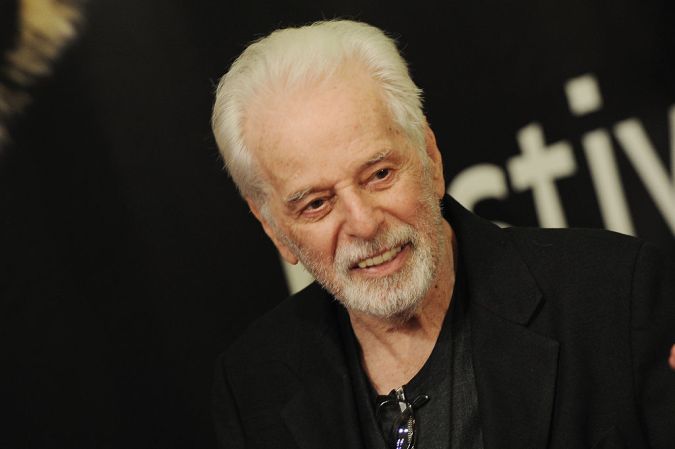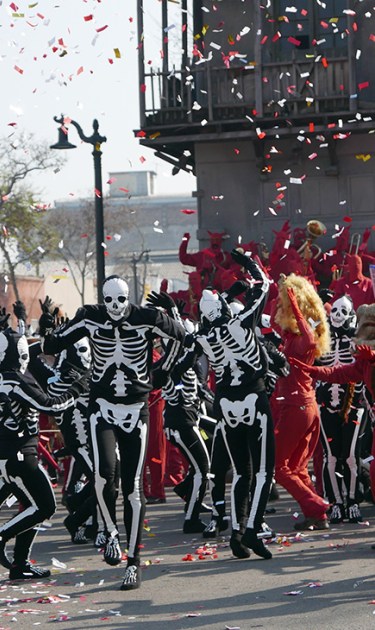Alejandro Jodorowsky isn’t exaggerating when he says the universe was conspiring to help him finish his latest film, Poesía sin fin (Endless Poetry). The multi-hyphenate artist—he is, among other things, a director, writer, actor, author, composer, poet, and spiritual guru—knew going in that this sequel to La danza de la realidad (The Dance of Reality) wouldn’t be an easy shoot. For starters, whereas other directors telling their own story might have chosen a straightforward approach, the inventive Jodorowsky has instead crafted a magical realist fable. Backdrops are often full-sized old-timey drawings that cover up buildings. His mother’s character only communicates by singing opera. And Jodorowsky himself functions as a narrator of sorts as his sons Adan and Brontis play, respectively, younger versions of himself and his father.
The ambitious project was partly crowd-funded, which left the French-Chilean director with the artistic freedom to create the film he wanted. Thankfully, the world (or God, he’d say) was all too eager to help him realize his vision. When he needed an entire circus to be full of extras, a simple Twitter call filled the space with over 5,000 people. When he needed a horse that was well-behaved even while wearing a skeleton costume – a guy knew a guy who had one they could borrow. And when he needed an animal’s head as a prop for his parents’ bedroom? Well, he didn’t really, but he wasn’t going to turn it down and it ended up working out quite perfectly, actually.
Ahead of the film’s release, which is now in theaters, Remezcla sat down with the prolific director. Just as the film we were discussing, the conversation was full of incredible anecdotes you almost can’t believe are true. Among other things, we learned why he’s not interested in making “mainstream” work, how he turned accidents into opportunities, and the reason behind the film’s most sex-positive scene. Check out some highlights from our chat below.
On Choosing To Direct A Series of Autobiopics
I’m searching for honesty. That’s what I say. Art needs to be honest. I like Rembrandt, the painter. He made a lot of self-portraits. A lot. And it was very good art. He thought, ‘I’m interesting.’ I’ve lived a life that’s very different from a regular life, by circumstance. And I have a big imagination, so now I’m recreating my life, in a good way. Why? Because always I was speaking about the problem with my father.

I can change my point of view of the past. I can color my memories.
When I made El Topo, there’s a cowboy there and he speaks with a boy—but the cowboy was my father and the little boy was me. I was projecting in disguise my life in all my pictures. So I said, well, all the artists do that. They write a novel; they’re just speaking of themselves! Why should I not speak about myself directly? And that’s when I started to do that. But then I said, I don’t want to tell exactly what happened. My movies are not the exact reality, no? I will change the reality because the past you can change. How? Bueno, the past is enormous but you have only one point of view. At a specific age. The father I have in my mind is a very strong guy, who’s being seen by a little boy. But I can change my point of view of the past. Like those old pictures, of Frankenstein and the Wolf Man. They’re in black and white but I can color them, and I will color my memory in the same way. For example, my mother was a woman who wanted to be an opera singer. So I will let her sing her opera. I will realize that. Now, in my memory she’s an opera singer. It’s better, now.

On The Sanctity Of His Art
For me the art is sacred art. I am not making industrial art. The only goal of the industrial art is money. I am not working for money. I am working for my work. For myself. And to show these treasures I find in myself. That is the work I am doing. I give myself by showing the other how to be yourself without fear. Art needs to be artificial but at the same time it has to be completely real. We are speaking of realities—but artistic realities mixed with life. I act like a poet, because a poet wants to express himself.
On Turning Challenges Into Assets
There wasn’t a hard part. Everything was difficult, because you are fighting against a machine, the workers, the person who doesn’t understand, the egos, the money. It’s an army! That is difficult. But those are material difficulties. Spiritually, you’re receiving and then you use what you are receiving. You want some examples?
On Dealing With Uncooperative Actors
First example. When the Jewish family is there, in that scene, you see my mother’s mother. And then they’re all eating there. To cast the mother of my mother I made a contract with an old actress of 70 years who was a big musicals star and she had a big big ego. She didn’t memorize the text. She was arguing. Not taking direction. She basically was playing the big star on set—I lost an entire day of shooting. For me, that’s a catastrophe, because with the little money I have, every day was $50,000. I lost that much one day because of her damn ego. So I called her that night and told her all this! I told her, if you can’t remember your lines, tell me and I’ll write them out for you. But you need to tell me. And don’t play the star. So I told her that she had to be there first thing in the morning with everyone else. Next morning: she didn’t come. I thought she was on an ego trip so I asked my team to go look for her in her house. She didn’t open. I told them, she cannot do this to me. She signed a contract, force open the door! They did it and—she was dead. That night she died. Maybe I killed her, I don’t know. I mean, I don’t think you can kill a person because you say they’re acting badly. But she died and we were sorry about that. But in another way, I said, ‘Thank you, God.’ Because she was killing my film. So we just cast another actress who was playing another role. And she was fantastic!
On The Origin Of That Bloody Sex Scene
Another example, which is weirder. I had a little woman in the cast. I sat her down and told her, ‘Listen, you need to help me. We have a sex scene and I don’t know how you have sex. You have a man?’ And said that yes, she was with a tall man, yes. So she explained all the positions and everything to me. Then I asked her, ‘But you know you’ll have to be naked, yes?’ ‘I’ll do it if you pay me twice as much,’ she said. I offered three times as much to make sure she’d do it. She agreed. The next day I hear that she doesn’t want to play the scene! So I go and talk to her because we’d agreed, you know? And she says she can’t play the scene because she’s menstruating. “Fantastic!” I told her. We’ll use that. We’ll break the prejudice of the woman, he’ll make love to you with that, and use it in the film. It’s very revolutionary, actually, because nobody in the movies does it or talks about it like that. But I did it. And God gave me that. You receive gifts when you are passionate about your work. A lot of gifts, actually. It’s magic.
Endless Poetry is now open in Limited Release




